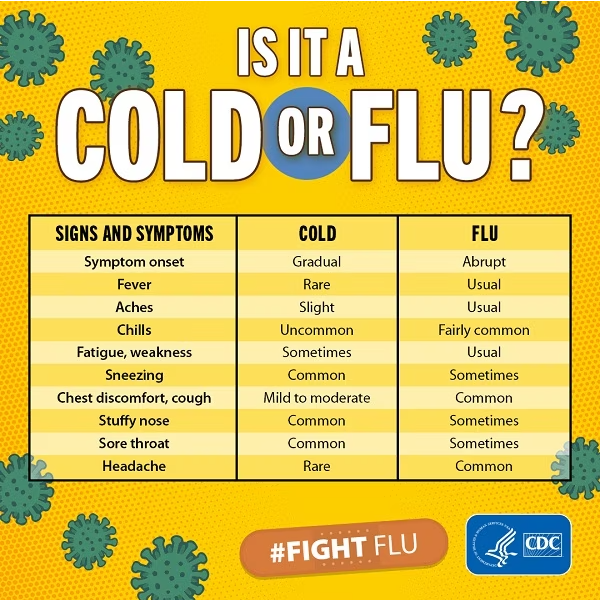As the seasons change, seasonal illnesses like the common cold and influenza often increase, often leaving many unsure whether they’re battling a cold or the flu. In the 11 cities and towns that make up the Uncas Health District, understanding the differences between these ailments becomes crucial for timely treatment and prevention.
Symptoms
- Common Cold:
- Onset: Symptoms generally develop gradually.
- Nasal Congestion: A runny or stuffy nose is a common symptom.
- Sore Throat: Mild to moderate discomfort in the throat.
- Sneezing and Coughing: Frequent sneezing and a mild, hacking cough are typical.
- Mild Fatigue: Feeling tired or rundown may occur but is usually manageable.
- Influenza (Flu):
- Sudden Onset: Symptoms often hit abruptly and severely.
- Fever: High fever (typically above 100.4°F or 38°C) is common and can last for several days.
- Muscle Aches: Severe body aches and pains, sometimes affecting the entire body.
- Fatigue: Overwhelming tiredness and weakness are typical and can last for weeks.
- Dry Cough: A persistent and often severe cough is common.

Differentiating Between Cold and Flu
- Fever: While it’s possible to have a low-grade fever with a cold, higher fevers are more indicative of the flu.
- Intensity of Symptoms: The flu tends to make you feel significantly more unwell compared to a common cold.
- Duration: Colds usually last for about a week, while the flu can persist for longer periods, leaving you fatigued for weeks.
Seeking Medical Attention
If you suspect you have the flu, especially if you are at high risk for complications (children, the elderly, or those with underlying health conditions), it’s essential to consult a healthcare professional promptly.
Preventative Measures
- Vaccination: Yearly flu shots can significantly reduce your risk of contracting the flu.
- Hygiene Practices: Regular handwashing, covering coughs and sneezes, and avoiding close contact with sick individuals can prevent the spread of both illnesses.
Understanding the differences between the common cold and influenza can drive appropriate health actions. By recognizing symptoms and taking preventative measures, individuals can navigate flu season with greater awareness and safeguard themselves against cold and flu.
Remember, while this information serves as a guide, consulting a healthcare professional for accurate diagnosis and treatment is crucial if you’re experiencing severe symptoms or are at high risk for complications.
For more information on differentiating the common cold from influenza, please visit: https://www.cdc.gov/flu/symptoms/coldflu.htm#
For a listing of Uncas Health District Flu Shot Clinics and other events, please click here.
